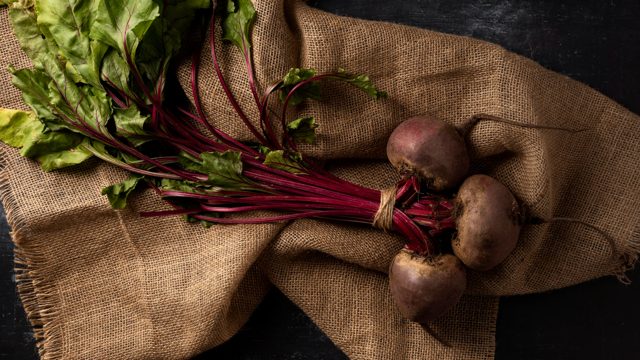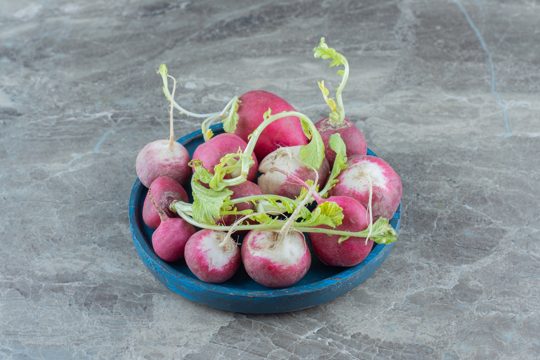6 Healthiest Root Vegetables You Need to Add to Your Diet!
Root vegetables are the underground parts of plants that are edible. Not only are they tasty and versatile, theyre also packed with fiber, vitamins, and other essential nutrients.
Here are the 6 healthiest root vegetables you should consider incorporating into your balanced diet. Root vegetables, often overlooked and underestimated, are the hidden treasures that lie beneath the soil surface. They are the subterranean parts of plants that we can consume, offering a unique blend of flavors that can transform even the most ordinary dishes into extraordinary culinary delights. These unsung heroes of the vegetable kingdom not only burst with delicious taste and an impressive versatility that allows them to be used in a multitude of dishes, but they are also nutritional powerhouses. They are densely packed with an array of essential nutrients including a generous dose of dietary fiber, a host of vitamins and minerals, and a plethora of other vital nutrients. Each root vegetable holds its own unique profile of health-promoting compounds.

From the deep, earthy sweetness of a beetroot, the nutty crunch of a carrot, to the creamy texture of a well-cooked parsnip, root vegetables bring an array of tantalizing textures and flavors to your plate. Whether they're baked, roasted, steamed, or mashed, these underground gems can be transformed into a wide array of dishes, making them an incredibly versatile addition to your culinary repertoire.
As a healthy foodie, you'll be thrilled by the six most nutritious root vegetables that should be a staple in your balanced diet. These nutritional dynamos are not only good for you but also offer an exciting way to add variety to your meals. Get ready to dive into the exciting world of root vegetables, where vibrant colors, tantalizing tastes, and powerful nutrients are waiting to be unearthed. So, let's pull out these subterranean wonders from the ground and explore their health benefits, culinary uses, and the ways they can enrich your diet. This is the completed part of a journey into the nutritious and delicious world of root vegetables.
1. Carrots: A Feast for the Eyes and More
Carrots are a great source of beta-carotene, which your body converts into vitamin A. This vitamin is essential for good vision, hence the saying that carrots are good for your eyes.
They are also low in calories and high in fiber, making them an excellent choice for those trying to maintain a healthy weight. Absolutely! Carrots, those vibrant, crunchy powerhouses, are a spectacularly rich source of beta-carotene, a beneficial compound that your body ingeniously transforms into vitamin A. This critical vitamin plays a pivotal role in maintaining the health of our eyes, thereby lending credence to the age-old adage that carrots are the ultimate superfood for your eyes. But the goodness of carrots doesn't stop there. They are remarkably low in calories yet high in dietary fiber, a combination that is just perfect for anyone embarking on a weight management journey.

Packed with fiber, carrots help you feel full longer, reducing the need for frequent snacking, and contributing to a healthier calorie intake. Carrots are not just about vitamins and fiber, though.
They also come packed with a variety of other nutrients, including potassium, vitamin K, and antioxidants, making them a well-rounded addition to any diet. So, whether you prefer them raw in salads, cooked in soups, or even juiced, adding carrots to your diet can bring about significant health benefits. Their sweet, earthy flavor, and satisfying crunch make them as delicious as they are nutritious. So remember, the humble carrot is more than just a tasty vegetable—it's a nutritional powerhouse that can play a starring role in your journey towards a healthier lifestyle.
2. Sweet Potatoes: A Nutritional Powerhouse
Sweet potatoes are not only delicious, but theyre also packed with nutrients. They are high in vitamin C and contain a good amount of fiber, which can help you feel full longer.
Additionally, they provide a significant amount of carbohydrates, essential for energy production. Sweet potatoes, with their sunset-orange hue and delectably rich flavor, are not only a delightful addition to any meal but are also bursting with health benefits. Revered for their delicious, earthy taste, they are a nature's bounty, packed to the brim with an array of vital nutrients. They are an excellent source of vitamin C, a key nutrient that plays a significant role in boosting the immune system, aiding in collagen production, and enhancing iron absorption. This makes sweet potatoes a superfood for maintaining skin health and overall wellness. Also, these tubers are a powerhouse of fiber, making them an excellent choice for those looking to manage their weight. The fiber content aids digestion, promotes a feeling of satiety, and helps in maintaining steady blood sugar levels. This means, including sweet potatoes in your diet can keep you feeling full longer, reducing the urge to snack on unhealthy foods.

Moreover, sweet potatoes are an incredible source of carbohydrates. These carbs are critical for fueling all bodily functions, particularly energy production.
They provide the much-needed boost to carry out both mental and physical activities effectively. Given their high carb content, sweet potatoes are ideal for those needing sustained energy throughout the day, like athletes or individuals with physically demanding jobs. In short, sweet potatoes are an irresistible blend of taste and nutrition. They are a versatile ingredient that can enhance the nutritional profile of a wide range of dishes. Whether you are looking to revamp your diet or simply seeking a nutrient-dense food, sweet potatoes are a fantastic choice. So, the next time you are at the grocery store, don't overlook these nutritional gems! They are a testament to the fact that the tastiest foods can indeed be the healthiest.
3. Beets: A Root Vegetable for a Healthy Heart
Beets are known for their deep red color and slightly sweet taste. They are packed with nutrients and low in calories.
The fiber in beets helps to reduce cholesterol and lower the risk of heart disease. Additionally, they are a good source of folate and manganese. Vibrant and enigmatic, beets are renowned for their deep, eye-catching crimson hue that paints a striking picture on any dinner plate. They don't just score high on visual appeal but also tantalize the taste buds with a unique blend of earthy robustness and subtle sweetness that is hard to find in any other vegetable. This makes them a versatile and flavorful addition to a variety of gourmet dishes and rustic meals alike. But the allure of beets goes far beyond their aesthetic and gastronomic charm. They are nutritional powerhouses, bursting with a plethora of essential nutrients while being impressively low in calories. As such, they cater to health enthusiasts and weight watchers who are always on the lookout for wholesome, low-calorie food options. One of the most noteworthy health benefits of beets is their high fiber content. This fiber does much more than just aid digestion.

It actively helps in the reduction of cholesterol levels in the blood, thereby lowering the risk of heart disease and promoting overall cardiovascular health. This makes beets an excellent heart-friendly food choice.
Additionally, beets are a rich source of folate and manganese, two vital nutrients that play a key role in maintaining good health. Folate is essential for DNA synthesis and repair, and it aids in the production of red and white blood cells. Manganese, on the other hand, is a powerful antioxidant that helps protect the body against the damaging effects of free radicals. In conclusion, beets are a harmonious blend of taste, health, and beauty. They are not just a feast for the eyes and palate, but also a boon for your body, offering a wide range of health benefits. This makes them a must-have in everyone's diet. So, the next time you come across beets in the grocery store, don't just walk past them. Embrace them and let them infuse your meals and your life with their vibrant color and robust health benefits.
4. Radish: A Refreshing and Nutrient-Packed Option
Radishes might be small, but they are mighty when it comes to their nutritional content. They are low in calories but high in vitamin C, making them a great choice for boosting your immune system.
Their crisp texture and slightly peppery flavor make them a refreshing addition to salads. While radishes may appear diminutive in size, they certainly pack a punch when it comes to their health benefits, proving that good things indeed come in small packages. These humble root vegetables are impressively low in calories, making them a fantastic choice for those wishing to maintain a balanced diet or even shed a few pounds. However, don't let their low-calorie content fool you into thinking they lack in other areas, as they are decidedly rich in vitamin C too. This means they are ideal for bolstering your immune system, helping you fend off those pesky colds and keep your health in check. But the appeal of radishes extends beyond their nutritional profile.

Their crisp texture provides a satisfying crunch that is sure to add a unique twist to your meals. Their slightly peppery flavor, on the other hand, is a delightful surprise: it's just enough to tickle your palate without being overwhelming.
This makes them a refreshing addition to salads, adding a pop of flavor to an otherwise simple dish. So, whether you're looking for a low-calorie snack, a vitamin C boost, or just a way to liven up your salad, radishes are a versatile choice that is sure to impress. Incorporate them into your diet, and you'll not only enjoy their distinctive flavor and texture, but also reap the myriad health benefits they offer. In short, radishes are small but mighty, and they are more than ready to prove their worth in your kitchen and your health regimen.
5. Turnips: Versatile and Nutrient-Rich
Turnips are a versatile root vegetable that can be roasted, boiled, or even eaten raw. They are a good source of vitamin C and also contain a decent amount of fiber.
Their mild flavor makes them a great addition to a variety of dishes. Turnips, an adaptable and versatile root vegetable, offer a plethora of options when it comes to culinary uses. Whether you prefer them roasted to perfection, bringing out their subtle sweetness, or boiled and mashed for a comforting side dish, turnips never disappoint. You can even enjoy them raw, thinly sliced in a fresh salad or as a crunchy addition to a veggie platter. These humble vegetables are far from being just a simple garnish. Beyond their culinary versatility, turnips are a powerhouse of nutrients.

They are packed with vitamin C, an essential antioxidant that helps protect your body against free radicals and boosts your immune system. But that's not all - turnips also contain a decent amount of fiber, which aids in digestion, supports heart health, and helps maintain a healthy weight.
Their naturally mild flavor makes them a fantastic addition to a variety of dishes. They can be seamlessly blended into stews and soups, contributing a slight sweetness without overpowering the other ingredients. You can also roast them with a sprinkle of your favorite spices for a tasty, healthy snack. Or even use them as a low-carb substitute in potato dishes. Indeed, the humble turnip is a culinary chameleon, capable of adapting to enhance whatever dish you're creating. So, why not experiment a little and incorporate these healthful, versatile root vegetables into your next meal?.
6. Parsnips: A Sweet Twist to Your Meals
Parsnips may look like white carrots, but they have a sweet, nutty flavor that sets them apart. They are high in fiber and vitamin C, and also provide a good amount of carbohydrates.
Try roasting them for a sweet and nutritious addition to your meals. At first glance, parsnips may easily be mistaken for their colorful relatives, the white carrots, but delve a little deeper and you'll find a world of unique taste and nutrition. They boast a delightful, sweet and nutty flavor profile that distinguishes them from the more familiar taste of carrots. This unassuming root vegetable is truly a hidden gem in the world of produce. Packed with an impressive array of nutrients, parsnips are a powerhouse of health benefits.

Not only are they rich in dietary fiber that bolsters your digestive health, but they are also a good source of vitamin C, a potent antioxidant that helps protect the body against harmful free radicals. They're also a fantastic provider of carbohydrates, offering a sustained energy release to keep you powered throughout the day.
To truly unlock the potential of parsnips, try roasting them. This simple yet transformative cooking method enhances their innate sweetness, making them an irresistibly delicious addition to your meals. Whether as a side dish to your hearty roasts or as a key ingredient in a warming winter soup, roasted parsnips are sure to elevate your culinary experience. So go ahead, introduce this nutritious and flavorsome vegetable to your diet and relish the myriad of benefits it brings.
About us
Welcome to SeniorCaresHub! Welcome to our comprehensive senior care destination! We pride ourselves on being a trusted resource for all things related to caring for aging loved ones. We understand the unique needs and challenges that come with senior care, and our mission is to provide you with the information, resources, and support you need to confidently navigate this journey and help you provide the best possible care for your aging loved one.

